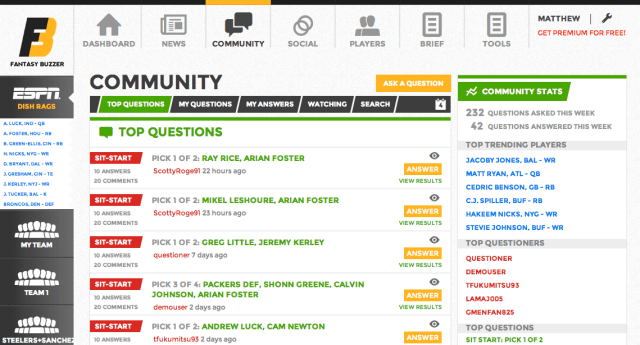With the start of fantasy football draft season nearly upon us, New York-based startup Fantasy Buzzer has launched a new website that aims to give fantasy buffs an edge with real-time news, injury alerts, and recommendations tailored to their teams. Because nothing is serious like fantasy football is serious.
Fantasy Buzzer, which won the $5K AT&T prize at the TechCrunch Disrupt NY Hackathon in May 2012, is meant to be a one-stop shop for fantasy research. It aggregates news and tweets concerning users’ teams, hosts Quora-like forums for users to poll each other for advice, and provides detailed profiles of all league players.
“Typically a person will spend 10 hours a week doing research, going to different sites, and figuring out what is the next best thing for them to do,” Fantasy Buzzer co-founder and CEO Pritesh Damani said. “They go to ESPN and NFL and read news. If, hypothetically, a player got injured, they’d look for advice on who to pick up next.”
Fantasy Buzzer also sends texts and push notifications backed by decision-making algorithms before game time to alert users if they’re making a mistake. This is particularly applicable on Sunday mornings, Damani said, when fans may be sleeping in after a party the night before.

Recommendations for users go beyond subbing in another player for someone with an injury, which Damani said is an easy suggestion to make. The site also tells users when they should coach a particular player who’s not on their team in order to use him for trades later and creates rankings for a poach list.
The market for fantasy football apps is big. In 2011, fantasy football represented at least 27 million people spending a total of 800 million in digital goods each year, and those numbers are growing. Fantasy football represents 75 percent of NFL.com’s total traffic. And people invest heavily in their teams because every fantasy league includes money bets, he said.
Fantasy Buzzer is capitalizing on fantasy footballers’ desire to get even the slightest edge over each other. The site offers premium upgrades for $30 per season, which gives those users priority on all the site’s features. They get alerts before everyone else and their questions are pushed to the top of the line.
Fantasy Buzzer raised $385,000 in a two-part seed round led by Payfone’s Mike Brody and will most likely raise again, Damani said.
It isn’t the first startup to enter this space, though. NumberFire launched in 2010 with a similar goal of being the last word in projections and news aggregation. They, too, built a question forum similar to Quora’s model.
With the many forums, blogs and news sites out there dedicated to Fantasy Football, Fantasy Buzzer will have to prove itself to users on the utility of its pushed recommendations and advice, which currently stand out as its primary differentiating factor.
